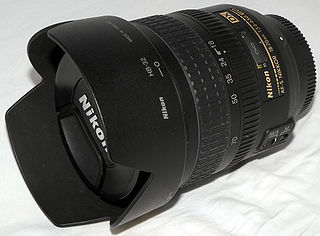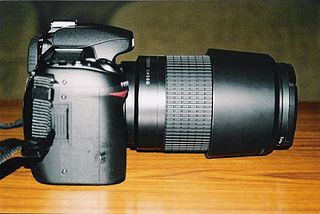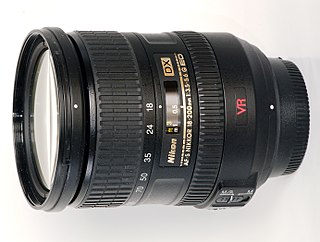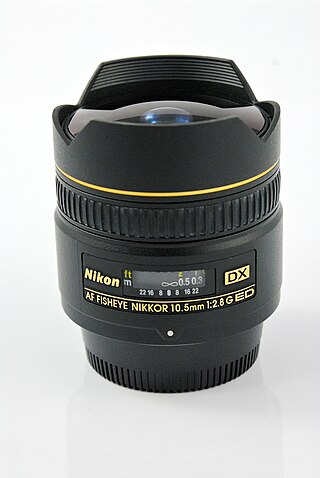
Nikon F 80-200mm lens refers to several generations of single-lens reflex telephoto zoom lenses for made by Japanese camera manufacturer Nikon.

Nikon F 80-200mm lens refers to several generations of single-lens reflex telephoto zoom lenses for made by Japanese camera manufacturer Nikon.
Nikon has manufactured nine different zoom lenses with a focal-length range of 80 to 200 mm range for its F-mount 35mm film cameras and latterly its digital SLR lineup. They were all released during the film camera era, but are compatible with Nikon's subsequent digital SLRs. All lenses have a push-pull design except where noted:
All models are out of production, including the latest "AF-S 80-200mm f/2.8D IF-ED". [2] Instead, Nikon has released a range of new lenses in a similar focal length, such as the AF-S VR 70-200mm f/2.8G lens in 2003. [3] The new lenses include Internal focusing (IF), vibration reduction (VR), and a fully-electronic control system which does without the traditional aperture control ring (G).
| Attribute | f/4.5 MK-I | f/4.5 MK-II | f/4.0 | f/2.8 ED | f/2.8 ED AF MK-I | f/2.8D ED AF MK-II | f/2.8D ED AF MK-III | f/4.5-5.6D AF | f/2.8D IF-ED AF-S |
|---|---|---|---|---|---|---|---|---|---|
| AF | | | |||||||
| Silent Wave Motor | | | |||||||
| Maximum aperture | f/4.5 | f/4.0 | f/2.8 | f/4.5-5.6 | f/2.8 | ||||
| Minimum aperture | f/32 | f/22 | f/32 | f/22 | |||||
| Weight | 880 g 1.94 lb | 750 g 1.65 lb | 810 g 1.79 lb | 1,900 g 4.2 lb | 1,200 g 2.6 lb | 1,300 g 2.9 lb | 300 g 0.66 lb | 1,580 g 3.48 lb | |
| Maximum diameter | 74.5 mm 2.93 in | 73 mm 2.9 in | 99 mm 3.9 in | 85.5 mm 3.37 in | 87 mm 3.4 in | 72 mm 2.8 in | 88 mm 3.5 in | ||
| Length | 162 mm 6.4 in | 223 mm 8.8 in | 184.5 mm 7.26 in | 185 mm 7.3 in | 187 mm 7.4 in | 87.5 mm 3.44 in | 187 mm 7.4 in | ||
| Filter diameter | 52mm | 62mm | 96mm | 77mm | 52mm | 77mm | |||
| Horizontal viewing angle | 25.4 - 10.3° | ||||||||
| Vertical viewing angle | 17.1 - 6.9° | ||||||||
| Diagonal viewing angle | 30.3 - 12.3° | ||||||||
| Groups/elements | 10/15 | 9/12 | 9/13 | 11/15 | 11/16 | 8/10 | 14/18 | ||
| # of diaphragm blades | 7 | 9 | 7 | 9 | |||||
| Closest focusing distance | 1.8 m 5.9 ft | 1.2 m 3.9 ft | 2.5 m 8.2 ft | 1.4 m 4.6 ft | 1.5 m 4.9 ft | ||||
| Release date | 1969 | 1977 | 1981 | 1982 | 1988 | 1992 | 1997 [4] | 1995 | 1998 [5] |
| Patent(s) | [6] | [7] | [8] | [9] | |||||
| MSRP $ | |||||||||
| Citations | [10] | [11] | [2] | ||||||

Sigma Corporation is a Japanese company, manufacturing cameras, lenses, flashes and other photographic accessories. All Sigma products are produced in the company's own Aizu factory in Bandai, Fukushima, Japan. Although Sigma produces several camera models, the company is best known for producing high-quality lenses and other accessories that are compatible with the cameras produced by other companies.

The Nikon 50 mm f/1.8D AF Nikkor is one of Nikon's 50 mm lenses. This Double-Gauss lens replaces the 50mm f/1.8 (non-D). A 50 mm prime lens is the normal lens for the 135 film format.
A kit lens is a "starter" lens which can be sold with an interchangeable-lens camera such as a single-lens reflex camera. It is generally an inexpensive lens priced at the lowest end of the manufacturer's range so as to not add much to a camera kit's price. The kit consists of the camera body, the lens, and various accessories usually necessary to get started in SLR photography. A kit lens can be sold by itself outside of a kit, particularly the ones that are moderately expensive; for instance a kit lens included in a prosumer SLR kit is often marketed as an upgrade lens for a consumer SLR. In addition, retailers often have promotions of standalone low-end SLR bodies without the lens, or a package that bundles the SLR body with one or two more expensive lenses.

The Nikon F-mount is a type of interchangeable lens mount developed by Nikon for its 35mm format single-lens reflex cameras. The F-mount was first introduced on the Nikon F camera in 1959, and features a three-lug bayonet mount with a 44 mm throat and a flange to focal plane distance of 46.5 mm. The company continues, with the 2020 D6 model, to use variations of the same lens mount specification for its film and digital SLR cameras.

The Nikon FM10 is a manual focus 35 mm film camera sold by Nikon Corporation. It is of SLR design and was first available in 1995. It is normally sold in a kit that includes a Zoom Nikkor 35–70 mm f/3.5-4.8 zoom lens, although a Zoom Nikkor 70–210 mm f/4.5-5.6 zoom lens is also available. An electronic companion model known as the FE10 was also sold at one stage.

The Nikon DX format is an alternative name used by Nikon corporation for APS-C image sensor format being approximately 24x16 mm. Its dimensions are about 2⁄3 those of the 35mm format. The format was created by Nikon for its digital SLR cameras, many of which are equipped with DX-sized sensors. DX format is very similar in size to sensors from Pentax, Sony and other camera manufacturers. All are referred to as APS-C, including the Canon cameras with a slightly smaller sensor.

The AF-S DX Zoom-Nikkor 18-70mm f/3.5-4.5G ED-IF is an F-mount zoom lens manufactured and sold by Nikon. Designed exclusively for use on Nikon DX format cameras, this lens covers from wide-angle to medium-telephoto range.
The 70-210mm lens is a telephoto zoom lens made by Nikon. The lens has an F-mount to work with all compatible Nikon SLRs and DSLRs.

The 70-300mm lens is a telephoto zoom lens made by Nikon. The lens has an F-mount to work with all the SLRs line of cameras, although the more recent AF-P lenses will not focus on film SLRs or older DSLRs.

The Nikon AF-S DX VR Zoom-Nikkor 18-200mm f/3.5-5.6G IF-ED is an image stabilised superzoom lens manufactured by Nikon for use on Nikon DX format digital SLR cameras. It provides a single-lens "walk-around" solution for wide-angle through to telephoto shots, as well as close-up photography.

The 55-200mm AF-S lens is a medium telephoto zoom lens manufactured by Nikon for use on Nikon DX format digital SLR cameras. It comes in three variants:

The AF DX Fisheye-Nikkor 10.5mm f/2.8G ED is a fisheye lens manufactured by Nikon for use on Nikon DX format digital SLR cameras. It provides a full 180-degree angle of view on a DX format camera.

The 18-55mm f/3.5-5.6G AF-S Zoom-Nikkor lens is a midrange zoom lens manufactured by Nikon for use on Nikon DX format digital SLR cameras. Often included as a kit lens on entry-level DSLRs, it also can be purchased separately from the camera body. Nikon first introduced the lens in 2005 and has provided three subsequent updates. Following are the four variants as of 2014:

The Nikon AF-S DX Zoom-Nikkor 16-85mm f/3.5-5.6G IF-ED VR is a wide to medium telephoto zoom lens produced by Nikon Corporation for its Nikon DX format digital SLR cameras.

The AF-S DX Nikkor 18-105mm f/3.5-5.6G ED VR is a superzoom lens manufactured by Nikon, introduced in August 2008 for use on Nikon DX format digital SLR cameras. This lens is sold as a kit lens for the Nikon D90, Nikon D7000, Nikon D5100, Nikon D5200 and Nikon D3200 cameras, but it also can be purchased separately from the camera body.

The Nikon 1 series is a discontinued camera line from Nikon, originally announced on 21 September 2011. The cameras utilized Nikon 1-mount lenses, and featured 1" CX format sensors.

The Nikon 1-mount is a type of interchangeable lens mount developed by Nikon for its Nikon CX format mirrorless interchangeable-lens cameras. The 1-mount was first introduced on the Nikon 1 series in 2011, and features a bayonet mount.

The Nikon AF-S Zoom-Nikkor 24-120mm f/4G IF-ED VR is a 5x Standard zoom lens with a fixed maximum aperture of f/4 throughout its entire zoom range.
The 18-300mm f/3.5-6.3G lens is a telephoto superzoom lens manufactured by Nikon for its line of DX DSLR cameras.